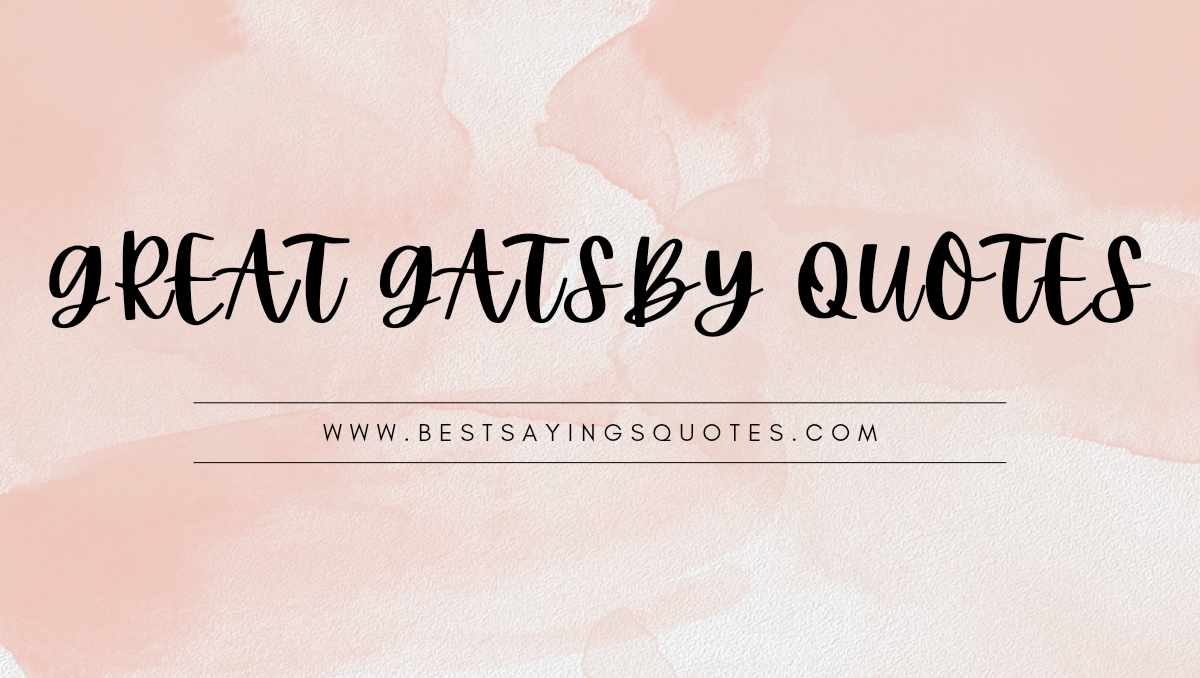Exploring the Timeless Wisdom of “The Great Gatsby”: A Journey Through Its Most Memorable Quotes
The Great Gatsby is a classic novel by F. Scott Fitzgerald that explores the themes of love, money, and the American dream in the 1920s.
The novel is narrated by Nick Carraway, a young man who moves to West Egg, Long Island, and becomes fascinated by his mysterious neighbor, Jay Gatsby, a self-made millionaire who throws lavish parties every night.
Nick soon learns that Gatsby is in love with Daisy Buchanan, Nick’s cousin and the wife of Tom Buchanan, a wealthy and unfaithful man.
Gatsby’s pursuit of Daisy leads to a tragic chain of events that reveals the corruption and emptiness of the high society he aspires to join.
One of the most remarkable features of The Great Gatsby is the richness and beauty of its language. Fitzgerald’s prose is full of vivid imagery, symbolism, and memorable phrases that capture the essence of his characters and themes.
Quick Summary:
“The Great Gatsby” by F. Scott Fitzgerald is a classic novel filled with memorable quotes. Here are some of the most popular ones:
- “So we beat on, boats against the current, borne back ceaselessly into the past.”
- “Gatsby believed in the green light, the orgastic future that year by year recedes before us.”
- “I hope she’ll be a fool — that’s the best thing a girl can be in this world, a beautiful little fool.”
- “They’re a rotten crowd… You’re worth the whole damn bunch put together.”
- “There are only the pursued, the pursuing, the busy, and the tired.”
- “And I like large parties. They’re so intimate. At small parties there isn’t any privacy.”
- “Whenever you feel like criticizing any one…just remember that all the people in this world haven’t had the advantages that you’ve had.”
These quotes capture various themes and emotions in the novel, from hope and disillusionment to social commentary and the pursuit of the American Dream.
F. Scott Fitzgerald’s “The Great Gatsby,” a masterpiece of American literature, has captured the imaginations of readers since its publication in 1925.
Set in the Roaring Twenties, the novel is a brilliant depiction of the Jazz Age, a time of prosperity, excess, and tragic disillusionment. Its enduring appeal lies not just in its vivid portrayal of this bygone era but also in the profound and poignant quotes that resonate with readers across generations.
Let’s delve into some of the most memorable quotes from “The Great Gatsby” and unravel their significance.
1. The Enduring Power of Hope and Dreams
“So we beat on, boats against the current, borne back ceaselessly into the past.”
This final line of the novel is perhaps its most famous. It poetically captures the essence of the human condition: the perpetual struggle against the tides of time and the relentless pursuit of unattainable dreams.
Gatsby’s unwavering belief in his dream, symbolized by the green light at the end of Daisy’s dock, is a poignant representation of the universal human yearning for something just out of reach.
2. The Illusion of the American Dream
“Gatsby believed in the green light, the orgastic future that year by year recedes before us.”
Fitzgerald uses the green light as a metaphor for Gatsby’s dream, which is intrinsically linked to the American Dream. This quote reflects the elusive nature of these dreams, always seeming just within grasp but perpetually out of reach, highlighting the novel’s critique of the American Dream as an illusion.
3. The Plight of Women in the 1920s
“I hope she’ll be a fool — that’s the best thing a girl can be in this world, a beautiful little fool.”
Spoken by Daisy Buchanan, this quote sheds light on the limited roles and expectations for women during the 1920s. It underscores the cynicism that women of that era had towards their place in society, suggesting that ignorance was the easiest path to happiness.
4. Gatsby’s Singular Worth
“They’re a rotten crowd… You’re worth the whole damn bunch put together.”
This affirmation by the novel’s narrator, Nick Carraway, towards Gatsby, serves to elevate Gatsby’s character above the superficiality and moral bankruptcy of the other characters. Despite his flaws, Gatsby is portrayed as having a certain greatness that the others lack.
5. The Complexity of Human Pursuits
“There are only the pursued, the pursuing, the busy, and the tired.”
This quote succinctly summarizes the various states of human existence, reflecting the endless cycle of desire and disillusionment that defines the characters’ lives in the novel.
6. The Irony of Social Gatherings
“And I like large parties. They’re so intimate. At small parties there isn’t any privacy.”
This paradoxical statement by Jordan Baker points to the superficiality of the social scene during the Jazz Age. The irony lies in the idea that amidst the chaos and impersonality of large gatherings, individuals can find a sense of intimacy and privacy that smaller gatherings cannot afford.
7. The Reflection on Privilege and Empathy
“Whenever you feel like criticizing any one…just remember that all the people in this world haven’t had the advantages that you’ve had.”
This opening quote by Nick’s father sets the tone for the novel. It serves as a reminder of the disparities in opportunity and experience, urging a sense of empathy and understanding towards others.
Conclusion
“The Great Gatsby” remains a powerful exploration of the American Dream, love, and the social dynamics of the 1920s. Its enduring quotes continue to offer insight into human nature, societal norms, and the timeless pursuit of happiness and fulfillment.
Fitzgerald’s eloquent prose and profound observations ensure that the novel’s legacy will endure, captivating readers for generations to come.

